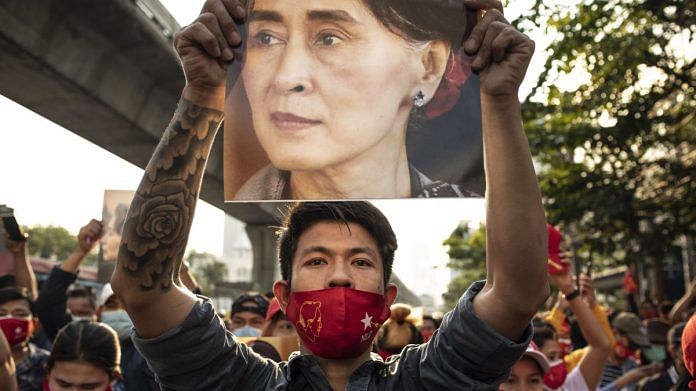New Delhi: In a shocking turn of events, the Myanmar military Monday seized power in a coup and declared a state of emergency in the country for a year.
Civilian leader Aung San Suu Kyi was detained along with other members of her National League for Democracy (NLD) party, as the military declared void their landslide victory at the polls.
Pointing out the significance of Myanmar to India, ThePrint’s Editor-in-chief Shekhar Gupta said, “It’s a neighbour with which we’ve had very ancient, old, strong, emotional, spiritual, cultural ties — and we have a lot of shared interests, economic but more importantly, strategic interests.”
In episode 674 of Cut The Clutter, Gupta explains the events that led up to the coup and its strategic implications for India and the region.
A military rule
“The interesting thing about Myanmar is that in some ways, it is very much like Pakistan in terms of its political history since the Second World War,” Gupta said. Like Pakistan, Burma or Myanmar as it now called, had a period of democracy from 1948 to 1962. The rule of the army generals began in 1961 following a coup by General Ne Win.
He set up a junta that started to rule the country. This military rule stretched from 1961 till 2011 when the first fair elections took place and Suu Kyi’s NLD won. “The army had accepted some kind of democracy because of global pressures,” Gupta explained. In 2015, Aung San Suu Kyi won the elections, once again, with a larger majority.
But as it turned out, despite the election results and a new constitution, Myanmar was not even “half a democracy”.
Armed forces were constitutionally given a position in national politics. This included a guaranteed 25 per cent of the 644 seats in the national Parliament, leaving the 476 seats to be contested in the elections. “So, in the latest elections of the 476 seats, Aung San Suu Kyi’s party won 396 seats — it was a landslide,” he said.
Interestingly, Aung San Suu Kyi was kept away from the presidential seat since in the Constitution that was drawn up, the military had inserted a line, possibly directed at Suu Kyi who had married British scholar Alexander Aris, that says that anybody who marries a foreigner cannot be the president of Myanmar.
Also read: 12 burning questions about the Myanmar coup answered
The ‘cardinal sins’ & a coup
Aung San Su Kyi’s cardinal sin in terms of the political situation was akin to that of former Pakistan prime minister Nawaz Sharif, who had remarked that the country’s reigns were neither completely in the hands of the army nor the elected government.
“She said that when she comes to power, she’ll amend the Constitution and she will progressively reduce the Army’s guaranteed seats in Parliament,” Gupta added.
Meanwhile, army chief Min Aung Hlaing’s 65-year-retirement deadline was also nearing. As Gupta pointed out, he was afraid that if he gave up power and retired, he would be put on trial for human rights abuses against the Rohingyas in the Rakhine state of Myanmar.
So on 1 February, the day when the Myanmar Parliament was supposed to convene with 80 per cent seats to the NLD, the army staged a coup. “They (the army) figured that they should collect a bunch of people who will say the elections were stolen … they started saying that nearly 86 million people had their names figuring in different electoral rolls in different cities (and) could have voted again,” Gupta said.
While taking over, the army said in a statement, that the election result could not have given the country a stable democracy.
What’s at stake for India
Gupta recalled instances which made it clear that the Indian government sees the military exercising real power in the country. This was particularly significant because of the stakes India has in the region.
For instance, India has stepped up its strategic engagement with Myanmar because of insurgent groups from the Northeast which have set up base in Myanmar. “Myanmar has let India reach out and carry out raids against Indian insurgent groups across the border … also, India is now selling Myanmar quite a bit of military hardware,” Gupta said.
But the biggest stake of all is Sittwe in the Rakhine province where India has built a large, deep seaport. The location of the port, which will play a central role in connecting the Northeast region to the sea, and China’s string of pearls policy are the reasons why India “has shied away from taking a clear position against the generals”, Gupta said.
Also read: Myanmar coup shows a new chapter in the Great Game of the East is unfolding. India watching



